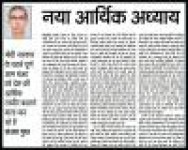Budget analysis in the Hindi press
The Hindi press struck a positive note on the Budget, shunning strong ideological positions.
ANAND VARDHAN enjoyed the sober analysis. Pix: The Dainik Jagran op-ed on March 1

THE HINDI PRISM
Anand Vardhan
Naya Arthik Adhayay (New Economic Chapter) is how the Sunday column of the editor of the country’s most-read newspaper has chosen to describe the most awaited speech in the financial calendar. The emphasis on ‘naya’ is the flavour of the season and the dreary world of financial news is hoping that it has the same kind of luck that the political arena has enjoyed of late.
Politics, and more precisely political contests, needs ever changing frames to remain box-office material because the media is grappling with ever shortening attention spans.
The Hindi media got lucky as recent political developments in the country, including the build-up to elections and their outcomes, kept the news cycle moving for the dailies and the news channels. Now a similar sense of anticipation has set in over the economy but the only problem is that number-crunching and jargon don’t lend themselves easily to a large section of Hindi readers and viewers.
So how did the Hindi press view the budget? Did it share the general editorial verdict of the English dailies, namely that, although the budget avoided big ticket announcements, it tried to present a cautious, balanced and an inclusive roadmap for the country’s economic management?
Even with the highest number of readers in the country, Dainik Jagran has no place for the pull of economic populism. The daily in its edit (Aarthik Uthaan ka Budget, Budget of Economic Uplift, 1 March), praised the government for steering clear of populist measures.
It said: “It was expected that, like the rail budget, the Modi government’s first general budget won’t be inspired by populist politics. What’s needed today is to give an economic direction to the country from scratch. Finance Minister Arun Jaitley has tried to do precisely that through this year’s budget. He has taken many significant steps to give momentum to growth, create employment avenues, facilitate a strong base for investment and do whatever is required to improve the condition of the agricultural sector.”
The paper also anticipated the usual criticism that such a budget would face, as the edit goes on to observe: “For fulfilling selfish and narrow political interests, it’s blatantly wrong to project development programmes as anti-people. Concern for the poor doesn’t mean to just provide them certain concessions and exemptions, and leave them to fend for themselves. This is what has been happening in the country. At least now the old style of political posturing should be abandoned.”
Interestingly, despite giving space in their opinion pages to the build up to the budget, Dainik Bhaskar and Jansatta chose not to have an editorial comment on it. It would have been particularly intriguing to see what Jansatta had to say about it given its tirades against the present government ever since it was sworn in.
One grew more curious as one of the English dailies, The Hindu, known for a similarly critical viewpoint on the government’s economic policies, somehow revised its views to praise Jaitley’s budget as ‘imaginative’.
In sync with the editorial verdicts of their flagship English publications, Hindustan (from The Hindustan Times group) and Navbharat Times (from The Times of India group) found merit in the budget.
While identifying elements of coherence and consistency in the government’s economic outlook (Buniyaadi Dhaachein Par Jor, Emphasis on Basic Infrastructure, 1 March), Hindustan said: “Along with announcing many measures to encourage private investment in basic infrastructure, the government is also going to invest in it on a large scale. In this budget, the finance minister has given more importance to investment rather than checking the budgetary deficit.”
Navbharat Times (Kaale Dhan par Nakel, Acting Tough on Black Money, 2 March) was particularly impressed with the budgetary announcement of a new comprehensive law to curb the menace of black money.
As this column mentioned after last year’s budget, translators have been working overtime to cope with the views of commentators who continue to infiltrate the Hindi discourse from the English side of the turf. Nothing unusual or undesirable about this but it reminded the Hindi press once again of the fact that it suffers from a shortage of in-house economic analysis.
Interestingly, one translator, Prabhat Khabar, has been given credit for the translation of M. J. Akbar’s piece (Nayee Arthvyavashta ka Pehla Khaka, First Draft of a New Economy, 2 March). Akbar, who is a BJP spokesman, dwells on how this budget has immense potential for employment generation.
Amar Ujala hasn’t extended same courtesy to the translator of Paranjoy Guha Thakurta’s budget piece in which there is a weird lament about the budget trying to please the poor along with other sections of the population.
Interestingly, the daily’s own editorial comment hasn’t fallen for the blinkers of either Thakurta’s analysis or Nilanjan Mukhopadhayay ‘s take on the budget in the same paper. The paper (Sudhar ki Umeedon ke Beech, Amid Hopes of Reform, 1 March) has given a thumbs up to the budget for its skilful financial management, laying out a solid roadmap for the years to come and fulfilling expectations in the necessary areas.
For a government that is yet to complete its first year in office, the Hindi editorials in different dailies showed a willingness to let the Finance Minister roll out an economic roadmap without giving him too much flak.
By striking such a positive note, irrespective of ideological perches, the Hindi press has played its own small role in detoxifying ‘analysis’ at a time when blinkered views are so widespread.
Such articles are only possible because of your support. Help the Hoot. The Hoot is an independent initiative of the Media Foundation and requires funds for independent media monitoring. Please support us. Every rupee helps.